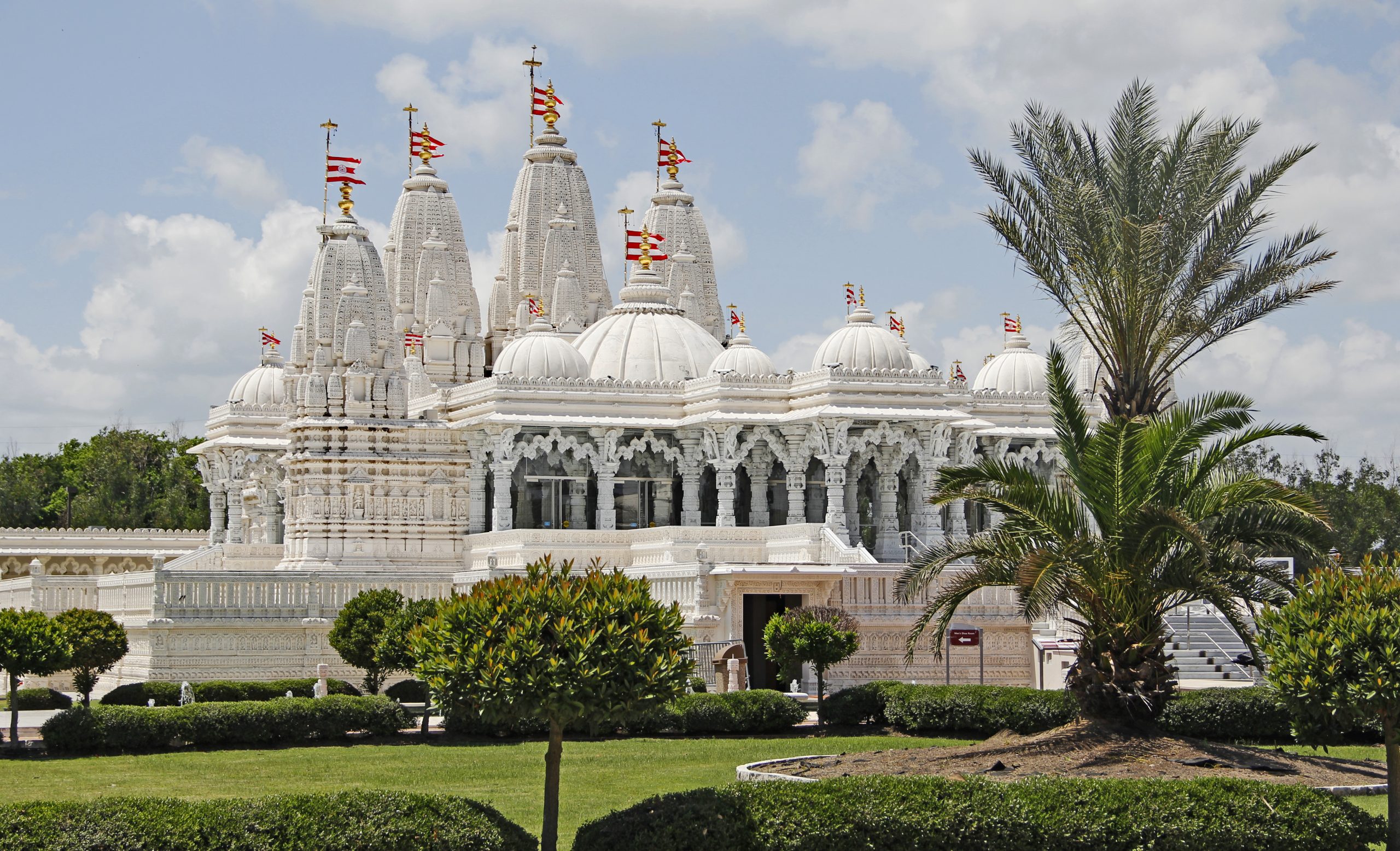
BAPS Shri Swaminarayan Mandir located outside Houston is the first traditional Hindu Mandir of its kind in North America. Photo by Ellsasha via Flickr/CC BY 2.0
What appears to be a white marble palace in a faraway land is in fact one of the state’s grandiose Hindu places of worship, known as a mandir. Located in Stafford, a suburb 20 miles southwest of Downtown Houston, the Bochasanwasi Shri Akshar Purushottam Swaminarayan Sanstha (BAPS) Shri Swaminarayan Mandir is an architectural wonder, representative of India—and all are welcome inside.
“The temple is open every day to devotees, well-wishers, or simply people looking for a quiet moment of contemplation,” says Meghal Patel, a BAPS representative and volunteer. “In a sense, they can experience a bit of India, right here in their backyard.”
Visit Texas' Hindu Temples
Pearland
Sri Meenakshi Temple
This temples honors the Hindu goddess Meenakshi, and is the only one of its kind outside of India. Constructed with imported granite, the structure showcases intricately carved columns and boasts a courtyard, peacock sanctuary, and restaurant touting South Indian eats. The temple is open to the public daily and asks that visitors respect rules like entering without shoes, dressing conservatively, and keeping shoulders and knees covered.
Austin
Radha Madhav Dham
Situated on more than 200 acres in southwest Austin, this is one of the largest Hindu temple complexes in North America. Surrounded by manicured lawns, water features, walking paths, and outdoor shrines, the 35,000-square-foot temple has attracted visitors from around the country since it opened in 1990. As a bonus, the property boasts an ashram–accommodations where devotees may stay for extended periods.
Houston
ISKCON of Houston
The International Society for Krishna Consciousness is a temple for the Hare Krishna community. The campus is open to the public daily. Conveniently located in the Garden Oaks neighborhood, visitors are drawn to the onsite vegetarian restaurant, Govinda’s.
As an Indian-born American living in Houston, and a longtime visitor of BAPS Shri Swaminarayan Mandir, I’m continuously astounded by the temple, namely for its awe-inspiring construction and exquisite workmanship. The 18-month process was met with jubilation from the city’s many Indian immigrants, including my parents, when it was completed in July 2004. Its construction involved piecing together more than 33,000 pieces of Italian marble and Turkish limestone that were hand carved in India before being shipped to Houston. The assembly was led by a team of volunteers, with the design and construction based on ancient Vedic texts. The result is a breathtaking landmark with serene environs that draws more than 150,000 visitors each year.
“We see lots of tourists and school groups, including architecture students from nearby universities,” Meghal says, noting that not all who venture inside practice Hinduism. “Visitors are not limited in their religious affiliations. They are broadly made up of folks from the community.”
After making countless visits in the last two decades, the temple has become a haven for me, in more ways than one. The gated property spans approximately 20 acres and encompasses the mandir, with several shrines showcasing murtis, or idols, of different deities; an assembly hall for weekly congregations and youth classes; a gift shop with books, postcards, and other keepsakes; and a casual vegetarian restaurant called Shayona Cafe.
“Vegetarianism is an important part of our cultural and religious traditions,” Meghal says. “Shayona Cafe makes available freshly prepared vegetarian meals in the evenings and on the weekends when there is an influx of visitors.”
With offerings like chaat and samosas; chole bhature, a platter of chana masala with deep-fried bread; and bountiful thalis, compartment plates touting rice with daal, or lentils, mixed vegetables, Indian pickles, and a sweet of some variety, Shayona Cafe is a destination in and of itself. The restaurant puts its own spin on popular non-Indian fare too, like burritos and pizza. “Naturally, Shayona Cafe caters to a much larger audience,” Meghal says.
The a la carte menu, along with a vast selection of pre-packaged snacks and sweets like masala chips, mixed nuts, and mithai (bite-size confections made of milk and sugar); are prepared by volunteers, with all sales benefiting the temple. “With a campus of this magnitude, the proceeds go back into its operations,” Meghal says.
With the exception of 10 swamis, or Hindu monks, who live onsite, BAPS Shri Swaminarayan Mandir is run entirely by volunteers. They lead tours, provide simple maintenance and landscaping, run the shop and café, and conduct Diwali festivities and musical programs. “Seva, or selfless giving, is an important concept of Hinduism,” Meghal says.
Subhash Patel, a longtime volunteer, has witnessed the masses wander in, year after year—from school-age children on field trips and seniors on midday outings to bloggers capturing a shot worthy of Instagram. “People have a lot of questions when they visit, and that is why we are here,” he says, laughing. The work is suitable for seniors like himself, who prefer not to work eight-hour shifts, but are more than happy to give three or four hours of their time as volunteers.
After roaming the campus on a recent visit, Subhash urged me to stick around for arti, a short ceremony of prayer, known as the offering of light to God. Harmonious chants flooded the majestic space, as the swamis led the prayer and paid forth blessings to all.
Nearly 20 years since its opening, the temple’s accessibility and “come one, come all” ethos allows it to remain a place where anyone can seek out fellowship, a moment of prayer, an education on architecture, or simply a meal made with thoughtful devotion.








